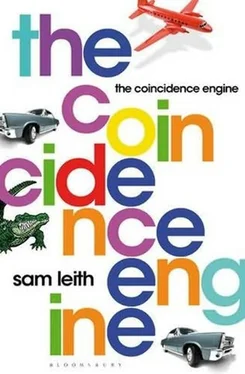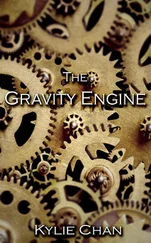The back of the cabin is windowless, and faces an escarpment – there’d be room to wriggle past, but not comfortably. As she peers round she sees a cat vanish into the crawl space under the cabin. It smells of sawdust and wet earth. He’s in the woods somewhere, presumably. She wonders about leaving a note, decides against.
She puts her face up against one of the windows, cups her hands around her eyes so she can see in. The room looks bare – there’s a dark rug of some sort on the floor, some sort of pallet up one end, drifts of yellow paper stacked on and around a table on the blank wall. On the table is an old-fashioned hurricane lamp.
The yellow paper… This is it. The letters all came on long sheets of ruled yellow paper from legal pads. The writing disciplined, intense, very small. She is remembering the first letter she had: two years ago, out of the blue, apparently in response to something she had written about him.
‘Dear Miss Holderness,’ it had begun. ‘The order of things is changing.’ The letter was written in English, albeit some of it curiously constructed.
It had been addressed in scrawled block capitals with her first name gone over several times in ink, care of ‘EtUdes/RecOltes’, University of Nice. On the back was a poste restante address in Carcassonne.
He had read, he said, the short introductory commentary she had written – there’d been some sort of dodgy French translation – on the value of his work to number theory for this small mathematical journal with its tiresome capitalisation.
She hadn’t believed it at first. Clearly Mike was winding her up. But would even Mike write forty pages just for the sake of a joke? And Mike didn’t know the maths well enough, she realised as she went on, to have written some of the material in the letter. Then she thought that it meant something momentous: if it was Banacharski, and he was still reading journals, it meant he might still be doing maths.
A subsequent page suggested otherwise. He had bought some artichokes at the market, and they had been wrapped in a photocopy of her article. This, Banacharski said, was of tremendous importance.
‘I ate these artichokes. There were four of them. And I counted each one the number of their petals, and counted each one the number of the fibres around their hearts. This took me several days. I have started to see what you are talking about. Your article shows a deep grasp of theory. Not in the meanings of your words, which are banal, but in the patterns of your words. You know this. I am now starting to learn. The problem is in disorder.’
Isla had been taken aback by this. She’d thought her article sensible enough.
There had followed – taking up most of the letter – a long, long string of numbers – a series with no apparent pattern to it. Then there were operations on these numbers. Some of these, as far as she could make out from the marginal notes, were derived from the number of letters in the successive words of her article; some had to do with the frequency with which given letters had recurred in the article; some had to do, in a complex way, with artichokes.
Banacharski was trying to sieve some sort of order out of the randomness. Nobody could do this. He was constructing equations, finding relationships, whittling the number string down… he was – as far as she could tell – trying to wrestle the data into abstract algebra. He was trying to use it to describe a shape in space time, or a manifold of that shape. He digressed, occasionally, into some impenetrable speculation about the symmetries of the artichoke.
His letter closed: ‘Write to me. There is not enough data. The work I am doing is important.’ Important was underlined three times.
Isla had tried to follow what was going on. He was mad, that was clear enough. It was a scarily powerful mind, she thought, in deep distress. She had been halfway through writing back when the second letter had arrived. It had been shorter, with moments of lucidity. ‘I am fighting with devils,’ it said. ‘Forgive me.’
She had written back, finally, with her home address in Cambridge – he never used it, continuing to write care of the magazine, whose name he sardonically recapitalised, she noticed, in every letter. She said nothing about artichokes. She was chatty, factual, friendly – and did everything she could to flatter him. She told him about work that had been done on his work. Two major conjectures, she said, had been proved. He hadn’t been active for seven years.
His letters had gone in and out of lucidity. None was shorter than twenty pages. The longest was eighty-six pages. They appeared at intervals of anything between two and ten days. One or two of the letters contained fragments that made straightforward mathematical sense. In most, the equations seemed to be somehow… bent.
Isla discussed them with a few colleagues, including – though she came slightly to regret it – Mike, but was shy of showing them to anyone. She felt somehow protective. She had a sense that Banacharski trusted her.
Frustration started to infect them, though, as time went on. For the last six months, things seemed to be gathering pace. He underlined heavily, used confusing ellipsis, the ascenders and descenders on his letters becoming longer and angrier. Some of his choices of word seemed odd, stilted – and he started to capitalise words at random within the text of his letters. He went on and on about something he called ‘ the churn ’, or the ‘ in-between space ’. It was as if she was supposed to understand something he was trying to communicate and was failing to.
His last letter – all of them, previously, had been signed, simply, ‘NB’ – was signed off ‘Affectionately, and in despair, Nicolas’.
All this has led her here. And she is looking, now, through the window of what must be his shack as a cloud passes over the sun and brings, in this high place, a slight chill.
She takes her face from the window and turns round and there he is. He is standing at the end of the wooden wall of his cabin, smiling at her. The first thing she takes in is the skin of his face. It is blotchy – a pattern of brown freckles alternating with a cross pink colour like sunburn. His eyes are deep-set. His lips are fat, old-man lips. His beard is dark grey, with a badger-stripe of white down one side, and spreads wide to his chest, across a striped and grubby shirt, open three buttons down.
Around his waist, higher than his trousers, is a length of what looks like baling twine, snarled in a scraggy version of a bow knot. He salutes her, then casts his eyes down and away, then looks up at her again. He beckons, flapping one hand while looking at his feet.
His feet are in flip-flops. His toenails are filthy.
‘ Alors, oui, entrez donc ,’ he says, shuffling round the corner and opening the screen door then the other one.
‘I’m Isla,’ she says.
‘Of course,’ he says, as he opens the door and ushers her in. There’s a strange look in his eye, she thinks.
‘Honestly?’ said Hands. ‘I think you have a problem.’
The interview had gone on late into the evening, though you would not know in the unchanging light of the room that it had done so. Functionaries had been and gone. Hands had spent several hours looking through sheaves of photocopies: selections from Banacharski’s letters, classified reports from Directorate sources in MIC, what scraps of intelligence were available.
The coffee in the cup marked Starbucks had been replaced by more coffee in another cup marked Starbucks and Hands had been given a very large cookie containing very large raisins, which he had eaten hungrily. The atmosphere was near enough genial.
‘The way you might want to think about it is this,’ said Hands, cupping his left elbow with his right hand and rubbing it thoughtfully. ‘If what you’ve described to me is correct, and I must stress if , then this device, or engine if you will, is going to be highly unpredictable in its behaviour. Highly unpredictable.’
Читать дальше












